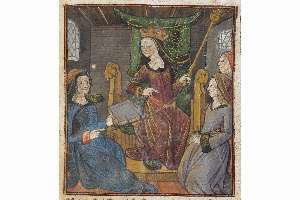Boccaccio exhibition features rare manuscript
11 Jul 2013
A University of Manchester academic has discovered an important and previously unknown manuscript by one of the medieval period’s greatest thinkers, who was born 700 years ago this year.

Dr Guyda Armstrong, Senior Lecturer in Italian, identified the uncatalogued manuscript by the Italian author and poet Giovanni Boccaccio in the University’s world famous John Rylands Library.
The manuscript, ‘Des cas des nobles hommes et femmes’, is a copy of a rare 1400 translation of the ‘De casibus virorum illustrium’, made by the French humanist and courtier Laurent de Premierfait.
The uncatalogued manuscript has been kept at the Library since 1963, but its existence was previously known only to a few curators before its significance was identified by Dr Armstrong. Library staff helped her identify its provenance.
Boccaccio, author of the 1351 Decameron, a collection of 100 tales ranging from the erotic to the tragic, and other works still influential today, will be honoured through a five-month exhibition at the University’s John Rylands Library.
It is curated by Dr Armstrong and Professor Stephen Milner from The University of Manchester and Dr Rhiannon Daniels from the University of Bristol.
The same team are also hosting 60 Boccaccio scholars from around the world at a conference called ‘Locating Boccaccio in 2013’ at Manchester Town Hall on 11-12 July, at which Dr Armstrong will reveal the existence of the manuscript.
She would now like to digitize the manuscript, so she can share it online with Boccaccio aficionados across the world.
She said: “The discovery of a completely unknown and unstudied manuscript in your specialist research area is every researcher’s dream. It’s a testament to the riches of the Rylands' collections that works of this importance are still being discovered.”
